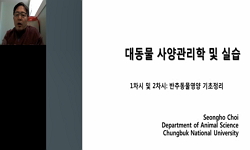High environmental temperatures observed during the summer month reduce bovine reproduction and fertility. In this study, we examined the effect of maternal thermal stress on the number of immature oocytes retrieved by OPU procedure from Jersey heifer...
http://chineseinput.net/에서 pinyin(병음)방식으로 중국어를 변환할 수 있습니다.
변환된 중국어를 복사하여 사용하시면 됩니다.
- 中文 을 입력하시려면 zhongwen을 입력하시고 space를누르시면됩니다.
- 北京 을 입력하시려면 beijing을 입력하시고 space를 누르시면 됩니다.
Effects of Maternal Thermal Stress on the Number of Retrieved Oocytes by Ovum Pick Up and Subsequent Embryo Development in Dairy Cattle
한글로보기https://www.riss.kr/link?id=A107947505
-
저자
Jihwan LEE ; Kyungsuk LEE ; Doosan KIM ; Junkyu SON ; Jian LEE ; Jinju KIM ; Gulwon JANG ; Manhye HAN
- 발행기관
- 학술지명
- 권호사항
-
발행연도
2021
-
작성언어
English
- 주제어
-
자료형태
학술저널
-
수록면
665-665(1쪽)
- 제공처
-
0
상세조회 -
0
다운로드
부가정보
다국어 초록 (Multilingual Abstract)
High environmental temperatures observed during the summer month reduce bovine reproduction and fertility. In this study, we examined the effect of maternal thermal stress on the number of immature oocytes retrieved by OPU procedure from Jersey heifers and their subsequent embryo developmental competence. Total 57, 69, 81 immature oocytes were retrieved from same donors (n = 3) in May (spring), June (early summer) and July (summer), respectively. Blastocyst rates were 33.3, 34.8 and 24.8% in spring, early summer and summer, respectively. Interestingly, we observed that the number of retrieved oocytes from donors were higher under extreme hot temperature (summer) than moderated temperature (spring). In contrast, blastocyst rates were lower under the hot weather. It is presumed that the reason for the increased number of retrieved oocytes in summer is associated with increased FSH levels by reduced progesterone levels due to impaired corpus luteum. And reduced embryo developmental competence in hot weather is thought to be associated with disruption of nuclear and cytoplasmic maturation. Taken together, our result suggest that maternal thermal stress affects the number of retrieved oocytes from dairy heifers and embryo developmental competence.
동일학술지(권/호) 다른 논문
-
- 한국생물공학회
- Bonyoung KOO
- 2021
-
- 한국생물공학회
- Bonyoung KOO
- 2021
-
The Effect of Persistent Organic Pollutants from Decomposed Fat on Mitochondria in Zebrafish Organs
- 한국생물공학회
- DongShin YANG
- 2021
-
- 한국생물공학회
- Songhee LEE
- 2021




 DBpia
DBpia



